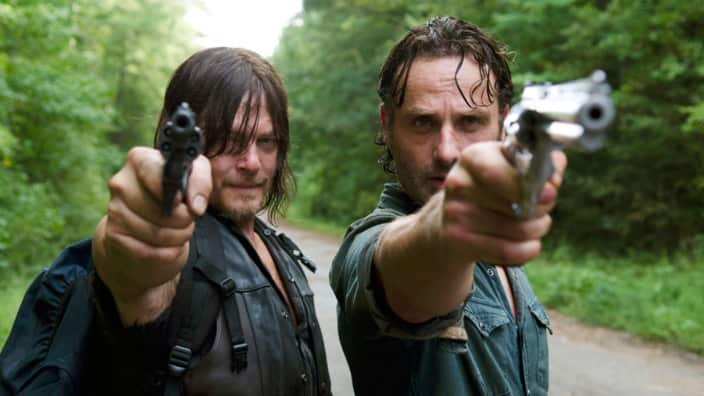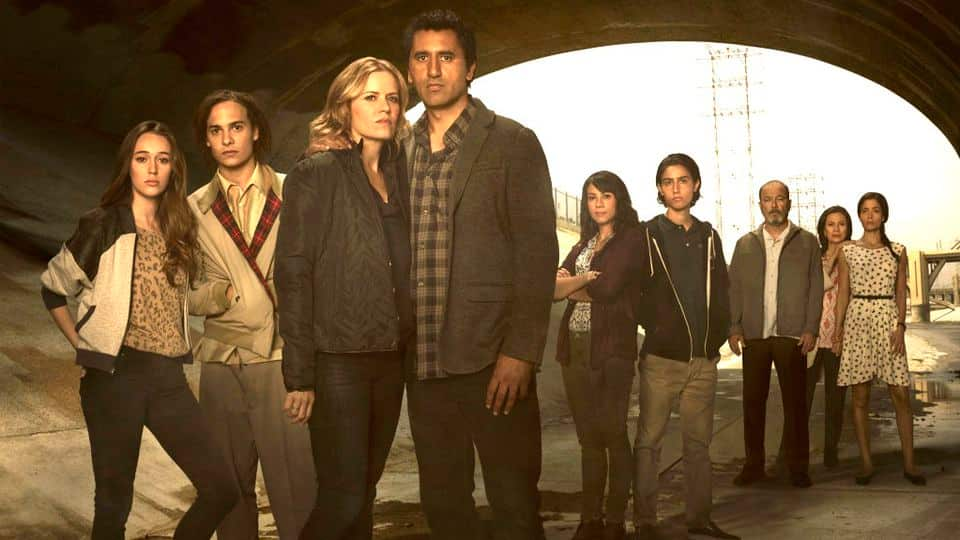Thanks to The Walking Dead we now know what the zombie apocalypse looks like. Or, at least we know how the US version of the zombie apocalypse will play out.
For those unfamiliar with the show, The Walking Dead follows Rick Grimes, a Sheriff Deputy who awakes from a coma to discover he’s slept through the zombie apocalypse. Grimes manages to outrun zombies and connect to a group of survivors, including his wife Lori and son Carl.
Over its six seasons, the show has explored domestic violence and how gender roles get skewered or reinforced within extreme conditions, explored the sanctity of life – is an undead human still a human and therefore to be treated with moral consideration? – and what happens to your humanity when the only choices are kill or be killed.
But despite facing the end of the world, Rick and his band of survivors are constitutionally incapable of uniting with their fellow human beings for the common good.
They’re extreme individualists: paranoid, obsessed with self-sufficiency and seemingly incapable of organising collective action that might extend beyond their own little “family” of fellow survivors.
In this, they’re the ideal of the contemporary era of dog-eat-dog global capitalism.
Of course, there are the occasional selfless acts for special individuals, but these tend to be the exception to the rule – and in many cases they’re provisional and temporary. But mostly, even when faced with an existential crisis, the characters in the The Walking Dead would rather maintain their commitment to individualism than band together.

In The Walking Dead, just as Margaret Thatcher famously put it in her 1987 interview with Women’s Own:
There is no such thing [as society]! There are individual men and women and there are families.
And when you add a shoot-first-ask-questions-later mentality to the mix, the combination is frequently pointlessly lethal. Despite being surrounded by death on an industrial scale, the characters seem to have few qualms about dispatching more of the ranks of the living dead.
Worse, they never seem to learn from one disaster to the next.
But what does the zombie apocalypse look like in other countries? What might Grimes and his ‘family’ find if they made it north to Canada or, even farther afield, to Norway or China.
Given that the writers of The Walking Dead have made it clear that zombies are created by a pre-existing condition, rather than a direct bite from a zombie, it’s safe to assume that the zombie apocalypse is a global phenomenon.
Perhaps people in other countries have experienced the same collapse confronting Grimes and his crew of survivors.
But an alternative vision is that, having had the experience of a quite different culture, the survivors managed a different outcome; one in which a response to the first signs of the zombie apocalypse were met with decisive and orderly action to contain it.
With their strong social democratic and centralised action, the Scandinavian countries, for example, might have fended off the worst aspects of the zombie apocalypse, mustering a collective response to a common enemy. In doing so, perhaps they have found a way to manage and contain the worst elements of it.

Of course, such a response would make for a far less interesting TV drama. It would be lucky to get one episode, let alone successive seasons. But it’s a useful thought experiment to question our present assumptions as to what is universal can blind us to alternatives.
The idea that a disaster necessarily brings out the worst in us, so that we revert to a state of nature characterised by an every-person-for-his-or-herself war, may highlight more about our own limited imagination, than our true capabilities.
It’s particularly useful to conduct such thought experiments when confronted with real “apocalyptic" events, such as those that swirl around global climate change and refugees.
In many instances, our responses are driven by our own biases about what counts as natural behaviour or what’s thinkable within the present context, rather than imagining what a genuine alternative might look like.
Being unable to think outside of our own political culture may lead us to the fate faced by Rick Grimes, floundering and repeating the same mistakes because we don’t have the imagination to think things afresh.
When we tackle our social, environmental and economic challenges with variations of the same limited solutions dreamed up by present-day assumptions about cut-throat capitalism, you have to wonder: who are the real zombies?
Christopher Scanlon teaches Journalism at La Trobe University
Tune in to #thefeedsbs at 7.30pm Monday-Thursday on SBS2, stream live, or follow us on Facebook, Twitter, Instagram, Tumblr, or Vine.
Check out SBS's selection of zombie movies on On Demand.
Through award winning storytelling, The Feed continues to break new ground with its compelling mix of current affairs, comedy, profiles and investigations. See Different. Know Better. Laugh Harder. Read more about The Feed
Have a story or comment? Contact Us


